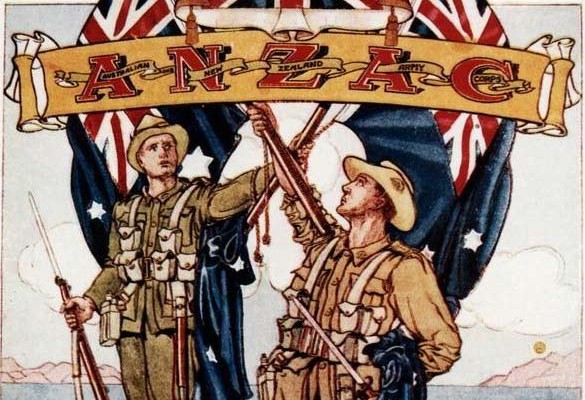The willingness of young Australians to risk death and injury to kill abroad has long puzzled the left. In the First World War, Australia produced an exceptionally high number of volunteers for the cause of the British Empire. Young Australian men, largely from the manual working-class, rallied to the defence of an imagined Britain whose boundaries stretched from Scotland to Tasmania.
Since 2014, a small but significant number of Australians have volunteered for the cause of the cause of the Islamic State: young and overwhelmingly male, they have rallied to the cause of an imagined Islamic community without clear boundaries in either space or time. The actions of both of these groups of volunteers have puzzled observers: are their actions a manifestation of avastatic irrationality or a distorted response to ‘real-world’ oppression and disadvantage?
Neither is the case: both the Anzacs and ISIS volunteers are expressions of the modernity of Australian capitalism.
The revolutionary left of the 1914–18 period often saw volunteers as having been brainwashed by cynical capitalists. The contemporary version of this analysis is the demonology of radicalisation and ‘hate preachers’. The recent rise of ‘Anzackery’, expressed in attendance at marches and youthful pilgrimages to Anzac Cove has troubled the left, which has tended to point to cultural manipulation by elites such as the uniquely charismatic John Howard. A minority current on the left, such as the work of Rob Bollard, has linked Anzac recruitment to ‘objective’ circumstances; for instance, high unemployment and falling wages.
The contemporary left’s challenge to the mainstream discourse on ‘radicalisation’ is similar: they emphasise economic disadvantage, state harassment and the pervasive impact of Islamophobia on many Australian Muslims. Yet, both explanations are unsatisfactory. Volunteering for a war where death is a real option is hardly a rational response to anything, and the ‘radicalisation’ hypothesis attributes a magical power to ideologies independent of real social relations.
Ideologies like imperial patriotism or ISIS-style Jihadism are not a reflection of individual material self-interest or the result of brainwashing by capitalist elites or religious leaders. Both are products of Australian capitalism as whole. Australia in 1915 was and in 2015 remains one of the most capitalist nations in the world. Indeed, Australia was the first nation-state created by global capitalism. The destruction of non-capitalist Indigenous society was unique in scale, while Australian farmers were rational participants in a global market, not European-style peasants. The very scale of racial violence and exclusion created a homogenous capitalist society.
Actually, regional and religious divisions in Australia have always been trivial compared to the US, Europe and China. In 1914 Australia, society was rationalised and boring. It was this homogenisation and rationalisation that underlay imperial patriotism. In such a homogenous society, economic inequality was the sole point of disagreement, as James Bryce saw in his 1921 book Modern Democracies. It was a purely capitalist society that created Australian labourism – widespread but shallowly based. It is a similar story today. For all the talk of diversity, modern Australia is a remarkably uniform society, one in which social identities are uniquely shaped by global capitalism. The Australia nation is a geographical expression: a plateau over which a few faded banners of mateship, Anzac and Australian values flutter.
Gary Brecher has argued that many volunteers for the cause of the Islamic State are driven by boredom – and that is why Belgium, the archetype of European welfare capitalism, has made a disproportionate contribution to Jihadist recruitment. Perhaps Australia is an antipodean Belgium, minus its ethnic divisions.
Much has been made of the horrifying levels of sexual violence associated with ISIS, but if sexual violence is about power, that was also a significant point for Anzacs. Australian soldiers were exceptionally sexually active overseas. And if sex is power, killing is the greatest power of all. As Niall Ferguson and Joanna Bourke have previously argued, killing can be pleasurable work.
Idealism matters, too. Many who volunteered for the First World War were inspired to battle Prussian militarism, as expressed in the atrocities committed by the German Army in Belgium. Today, the horrors perpetuated by the Baathist regime in Syria are a powerful recruiting tool for the Islamic State.
Death and violence are not archaic remnants of the past but tools that can create meaning and agency. Tadeus Tietze has argued that would-be Jihadists are hollow and debased symptoms of a hollow and debased society. He is correct that violence is not an individual response to personal experience, but it leaves open the question of what is the ‘hollowness’ of contemporary society. For liberals, it is from social exclusion that the marginalised derive a sense of purpose, understood as personal authenticity, while cultural conservatives point to liberalism’s alleged denial of values and inherent truth.
But in fact, capitalist society is not hollow and nihilistic. Rather, it is a society in which the forces that create meaning radically and constantly expand, but in which these forces are in conflict with existing relations of meaning. The appeal of the imagined communities of Empire and the Islamic State are manifestations of this very contradiction.



